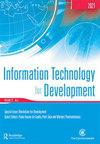E-formality and data justice: the individualization of street trade in Recife, Brazil
IF 5.1
3区 管理学
Q1 DEVELOPMENT STUDIES
引用次数: 0
Abstract
ABSTRACT Informal street trade has historically been seen by local authorities as backward, inefficient, and detrimental to urban areas and thus, has been subject to formalization policies. This paper reports on an ethnographic study of a project that sought to formalize street trade in Recife (Brazil). Street trade was presented by the City Council as hindering urban mobility, unhygienic and detrimental to the development of the city. A spreadsheet was developed to record, license and enforce the formalization of street trade. The spreadsheet and its classification scheme expanded the possibilities of control over individual street vendors. We will argue that formalization requires street traders to be rendered objects and subjects of knowledge. What this does is to individualize and discipline street trade. More substantially, we argue that the regulations and classification scheme shaped understandings of street trade as becoming individualized and this led to some contradictory implications for urban street trade.电子形式与数据公正:巴西累西腓街头贸易的个体化
非正规街头贸易在历史上一直被地方当局视为落后、低效和对城市地区不利,因此一直受到正规化政策的约束。本文报道了对累西腓(巴西)一个旨在使街头贸易正式化的项目的民族志研究。市议会认为街头贸易阻碍了城市的流动性,不卫生,不利于城市的发展。开发了一个电子表格来记录、许可和强制执行街头贸易的正规化。电子表格及其分类方案扩大了对个别街头小贩进行控制的可能性。我们会争辩说,形式化要求街头小贩成为知识的对象和主体。这样做是为了使街头贸易个性化和规范化。更重要的是,我们认为,法规和分类方案使人们对街头贸易的理解变得个性化,这对城市街头贸易产生了一些矛盾的影响。
本文章由计算机程序翻译,如有差异,请以英文原文为准。
求助全文
约1分钟内获得全文
求助全文
来源期刊

Information Technology for Development
Multiple-
CiteScore
11.30
自引率
16.70%
发文量
34
期刊介绍:
Information Technology for Development , with an established record for publishing quality research and influencing practice, is the first journal to have explicitly addressed global information technology issues and opportunities. It publishes social and technical research on the effects of Information Technology (IT) on economic, social and human development. The objective of the Journal is to provide a forum for policy-makers, practitioners, and academics to discuss strategies and best practices, tools and techniques for ascertaining the effects of IT infrastructures in government, civil societies and the private sector, and theories and frameworks that explain the effects of IT on development. The concept of development relates to social, economic and human outcomes from the implementation of Information and Communication Technology (ICT) tools, technologies, and infrastructures. In addition to being a valuable publication in the field of information systems, Information Technology for Development is also cited in fields such as public administration, economics, and international development and business, and has a particularly large readership in international agencies connected to the Commonwealth Secretariat, United Nations, and World Bank.
 求助内容:
求助内容: 应助结果提醒方式:
应助结果提醒方式:


